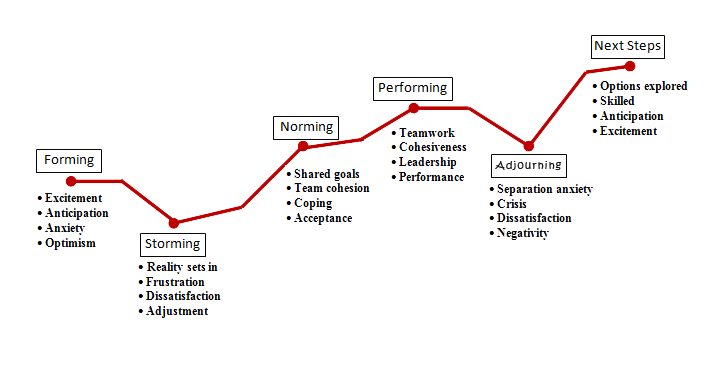Introduction
A group task is effectively an evaluation of candidate on psychological parameters and it helps the examiner understand how the candidates behave and act in a group, how their behavior alters in a group. There are a number of social dimensions and values that come into the picture when we start to deal with a group and this is reflected in a group task. The leadership qualities of an individual also come to the fore in a group task.
Group tasks are activities where a defined group of individuals need to perform a defined task and accomplish the goals assigned to them. Group members are expected to pitch in a variety of ways. They need to identify the nature of the problem, the best ways of dealing with it, provide specific facts and inputs that might be helpful in solving the problem, and ensure that communication channels are always open. Group tasks provide an opportunity to check the interpersonal skills of candidates and to check their commitment levels. Group members’ nature and degree of participation will help establish the kind of role they play in a group. Overall, the behavior of a group is dictated by the members and this determines how the group acts. For example, in some groups, members go out of their way to help others whereas in other groups self centered individuals dominate.
Why are Group Tasks conducted?
B-Schools / Organisation use Group Tasks/Group Exercises to test team work, interpersonal communication skills and the planning ability of the candidates. The panel needs to know if one can mix well with others; sometimes business simulated exercises are also given to test candidate's performance in real managerial situations. In such exercises, a candidate's ability to work in a team is put to test, while testing his convincing power and reasoning ability. The task is assigned to the group by the panelists in such a way that all get equal opportunity to perform to the best of their abilities, express themselves and give suggestions when asked for. Leadership skills , good team working skills , strong reasoning and decision making skills, negotiating skills, taking initiative , facilitating others to perform and speak ,showing a positive attitude, staying motivated (Intensity, Direction and Perseverance) are some of the traits a Team player must possess in order to successfully accomplish the task and get selected.
The candidate may be given an indoor practical task, outdoor group exercise, case studies, presentations, creating a proposal, performing skits, role plays and so on. Certain B schools (like SIBM-Pune, Bangalore & SCMHRD) evaluate candidates through such along with other selection tools. In one such exercise students were asked to organise an event for the B school. Other activities included forming a railway platform with a stack of papers provided, analyzing a situation or a picture, selling a product or preparing an election campaign.
B-Schools use Group Tasks/Group Exercises to evaluate candidates on:
- Leadership skills
- Organizing Ability
- Initiative
- Cooperation
- Negotiation skills
- Liveliness
- Determination
- Decision Making Ability
- Confidence
- Attitude
- Perseverance
- Reasoning Ability
- Persuasiveness
- Perseverance
- Motivation
Past Group Exercise Experiences
A group of 8 students were blindfolded and then given a twisted rope. They were asked to arrange themselves in such a way as to form an 8 pointed star. Similarly, the group members were asked to arrange themselves and form a square.
- There was a brick lying on the floor and the team members were asked to stand one above another on it.
- The team members were given a card board, chart paper, pencil to create any structure out of the materials provided, length being 150mm.
Tips for performing Group Activities:
- Listen attentively and make notes of the information provided.
- Divide the task into bundle of activities so that the whole team can work together (plan a work breakdown structure).
- Stay focused on the goal and remember team working skills are being tested.
- Try to create an environment where communicating with team mates, taking reasonable risks and actions is possible.
- Creativity, participative leadership, thinking out of the box and strong reasoning is required to complete the task.
- Take initiative but don't underestimate your team mates. True that the team's success would be your success but be slightly diplomatic since this a competition and you will be evaluated individually.
- Remember Synergy is important for achieving goal (1+1 = 3).
- Its observed that any group formation has generally these 5 stages(Tuckman's Model):
- FORMING: Getting Acquainted and Establishing Ground rules
- STORMING: Showing of hostilities and Resisting control by Group Leader
- NORMING: Start working and developing close relationships
- PERFORMING: Working towards goal achievement
- ADJOURNING: Post task completion

- Have confidence in what you do and persevere (don't give up till the last minute).
- Perform your role keeping in mind that you are being observed by the panel.
It is important to know that that the rationale behind group tasks is to check the candidate's competence on team building skills, Leadership, handling pressure, etc. The contemporary management practices emphasize more on Team work now, since managers need to handle live projects. So these team activities are an attempt to simulate actual managerial dilemmas, an insight into real corporate complexities.
